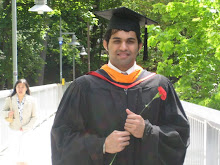"Jo jeeta wohi sikandar". This is the theme of all democracy. In democracies all over the world, Presidential or Parliament, the rule of the game is one word - majority. You need a majority in the house of representatives i.e. Lok Sabha in the case of India; House of commons in the United Kingdom or the Congress in the US. It makes sense to have the Government have their nominees and take the accountability.
In most democracies around the world, the incumbent makes appointments using his executive power and this decision has to have the backing of the majority in the house of representatives. In case of Parliamentary system the backing is implicit but in the Presidential system, this is explicitly done. In short, the executive is empowered with the mandate of the people and accountable for the decisions taken during the term in office. Now, no where except in India, that people are saying the following "we mandate you to take decisions on our behalf, but we do not trust you, so you must involve a healthy mix of people outside the government to take these decisions". Its absurd and the executive cannot function in this manner. You cannot hamstring the executive by taking over its power or eroding it. If we need a stable India, we must allow the executive to function. Despite my political leanings, I have been pretty clear in my mind about the constitutional obligations of every limb of the constitution. We need a healthy Judiciary who functions independent of the legislature and the executive and provides a legal remedy for laws enacted in violation of the constitutional spirit or sets aside executive orders which are "not in law". I feel this should be the ambit and limit in which judiciary must function. Executive must take accountability of all the laws made and execute them in the letter and spirit of the constitution. Law and order and national security must also be solely the prerogative of the executive. The Legislature must at all times limit itself to making effective laws and discuss the workability of existing laws. If each limb works within its limits, we have a wonderful and functioning democracy. Problems occur when one starts to get into the ambit of the other.
Today, I read in an editorial column of the Times of India about appointment of Lok pal. It seems to the editor that if a Government appoints the Lokpal, then it would not be independent. I would like to question this. We must know that the Chief Justice of India (CJI) is appointed by the President, armed with executive orders by the cabinet. The COAS /COAF/CONS (various defense heads) is appointed by the Government. The Chief Justice of all the high courts are appointed by the CJI with advice from the Government. Union government appoints all the IAS officers of union cadre with Chielf Election Commissioner, Comptroller & Auditor General and Chief Vigilance Commissioner included. We know in the past excellent people have occupied these eminent offices and there are various appointments that have gone bad (from time to time). Since we do not shower accolades of appointing a bright officer upon the executive, we must not blame it for a few bad appointments (unless mala-fide intent is proved). This brings me to my question. Why is the Lok Pal a holy cow whom the union government can not appoint. How come conflict of interest occurs in this one appointment, when in all other appointment, especially the Chief Election Commissioner (for electoral benefits) we don't question the Government. I find it a strange argument. Be that as it may. In some situations, people do not reason to logic and this happens to be one such occasion.
Democracy works best in a rule of majority of voices (since unanimity is impossible). In this case, the Government is the majority (unless voted out in the Parliament) and hence the opposition and civil society groups must respect that. Its good to show your dissent and make your voice heard, but its bad to cry hoarse and throw tantrums if your opinion is not adopted by the majority. As a majority, the Government holds the right to rule (for the period of the mandate) and should be allowed to rule. NO ONE MUST OVERRULE the government. If the days come when a minority decides, we will be greatly disadvantaged and governance paralysis will set in. I hope the Union government is listening and hopefully the PM enforces his authority and command as the Chief executive to the President of India.
So long....
Subscribe to:
Post Comments (Atom)

No comments:
Post a Comment